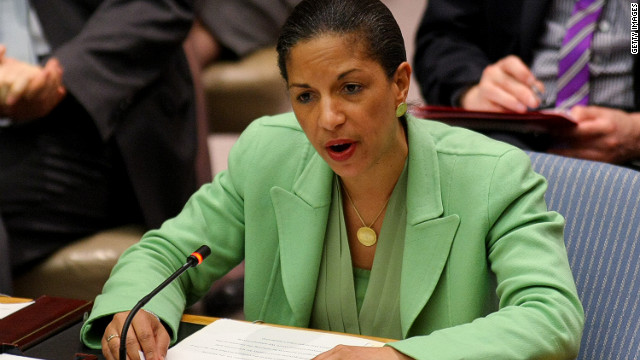Nov 27, 2012
Republican obsession with Benghazi makes no sense, CNN.com
Republican obsession with Benghazi makes no sense
By Peter Bergen, CNN National Security Analyst
updated 8:26 PM EST, Tue November 27, 2012

Rice meetings leave lawmakers uneasy
STORY HIGHLIGHTS
- Peter Bergen: Susan Rice's trip to Capitol Hill wasn't a success, senators said
- He says the GOP continues to bash Rice for her mistaken explanation for Benghazi attack
- Bergen says the argument that Obama administration deliberately lied doesn't hold up
- The intelligence community decided not to initially reveal truth about attack, he says

Peter Bergen
Sen. Lindsey Graham who also met with Rice observed, "Bottom line: I'm more disturbed now than I was before." What is the Republican theory of the case against Rice? It appears to boil down to the idea that leading Democrats covered up the involvement of terrorists in some way connected to al Qaeda in the Benghazi attack during the run-up to the close presidential election because President Obama and others in his administration had for some time said that al Qaeda was close to strategic defeat.
Become a fan of CNNOpinion
Stay up to date on the latest opinion, analysis and conversations through social media. Join us at Facebook/CNNOpinion and follow us @CNNOpinion on Twitter. We welcome your ideas and comments. Does this case make sense? First, you would have to accept that Obama, Rice and Secretary of State Hillary Clinton all knowingly deceived the American public about what had happened at the Benghazi consulate. When this notion was raised in October during the second presidential debate, Obama scolded Republican challenger Mitt Romney saying, "the suggestion that anybody in my team, whether the secretary of state, our U.N. ambassador -- anybody on my team -- would play politics or mislead when we've lost four of our own, Governor, is offensive." According to a CNN poll released Tuesday most Americans agree with the president and do not believe that anyone in his administration intentionally tried to mislead them about what happened in Benghazi Second, it was the intelligence community, not officials at the White House or State Department, that eliminated from the talking points used by Rice after the Benghazi attack the suspected involvement of the Libyan jihadist group, Ansar al-Sharia. According to accounts of former CIA director David Petraeus' closed door testimony about Benghazi to congressional intelligence committees earlier this month, the intelligence community eliminated references to Ansar al-Sharia in the talking points so as not to tip off members of the terrorist group that the CIA believed that they were responsible for the attack. The conspiracy therefore was not to mislead the American public but to mislead America's enemies. If Rice had gone beyond her unclassified talking points and said that Ansar al-Sharia was suspected to be behind the Benghazi attacks, no doubt she would now be being hounded for the unauthorized disclosure of classified information. Third, it is worth recalling that whenever there is a news event in a chaotic country on the other side of the world, first accounts about the event are often wrong. Remember the erroneous reports about another big news event last year; the death of Osama bin Laden. Initially, it was portrayed by the Obama administration that bin Laden had died during a firefight with U.S. forces in Pakistan and had used his wife as a human shield. As more accurate information subsequently came in from the field, administration officials clarified that bin Laden put up no resistance and had not used his wife as a shield. This is not conspiracy; this is the fog of war. It is also worth recalling that the situation in Benghazi was so chaotic and dangerous that it took three weeks for the FBI to get in to the city to investigate what had happened at the consulate. And it took even more time for the facts to emerge that the Benghazi mission wasn't really a consulate in any conventional sense, but was more of a CIA listening station and that two of the four Americans who had died in the attack weren't diplomats as initially portrayed but were, in fact, CIA contractors. Stepping back from the whole debate about how Rice came to make inaccurate public statements about Benghazi, there is another premise of the Republican attacks upon her that deserves considerable skepticism. We are supposed to believe that because Ansar al-Sharia -- a group inspired by al Qaeda's ideas, but having no links to the terrorist group that attacked the United States on 9/11 -- was able to pull off a deadly attack in a Middle Eastern country ravaged by a recent war against a lightly defended U.S. mission, killing four, that al Qaeda is suddenly an important threat again to the United States. If you buy that, I have a bridge in Benghazi I'd like to sell you.
FEATURED BOOK

